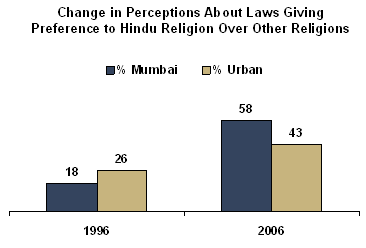GALLUP NEWS SERVICE
PRINCETON, NJ -- On July 11, the world learned of the latest in a series of orchestrated, large-scale bomb attacks by terrorists, this time in the city of Mumbai, India. Formerly known as Bombay, Mumbai is India's financial and entertainment capital, and one of the most populous cities in the world. Within 11 minutes, the seven bombs planted on the Western Railway commuter line went off during the evening rush hour, ultimately causing at least 200 deaths and injuring hundreds of others. A few hours after the incident, train service had resumed and by the next evening, the BSE Sensex -- India's bellwether equity market index -- ended up 3% for the day. Newspaper headlines rang with accounts of resilience in the face of adversity and the famous Mumbaikar spirit ruled the day.
An Outward Resilience
Data from the Gallup World Poll conducted in India in January and February this year, months before the bombings, as well as our data collected a decade ago, provide invaluable context in regard to the incident and have implications for the city going forward. The data capture this upbeat, resilient spirit among Mumbaiites. Eighty-eight percent of the residents of India living in Mumbai said they feel optimistic about their future, 89% expressed satisfaction with Mumbai as a place to live, and 72% said Mumbai is getting better as a place to live.
However, the city is not without its problems. Despite their optimism for the future of Mumbai, Mumbaiites rate their city poorly on Gallup's measures of governance. This is a city in which only 58% of residents have confidence in their local police force, only 53% have confidence in their local government, and as many as 39% of Mumbaiites perceive a lot of lawlessness. And at a time when strong leadership is crucial to easing religious tensions in the aftermath of the bombings, only 57% of Mumbaiites approve of their city leadership.
Changing Sentiments of the Hindu Majority
Mumbai has long been India's melting pot of religious, ethnic, and racial minorities -- and the majority of Mumbaiites give the city high marks for the accepting environment it provides to minority groups. Eighty percent of Mumbaiites surveyed believe that Mumbai is a good place for religious, ethnic, and racial minorities to live.
And yet this city -- in which more than 9 in 10 would say that religion plays an important part in their daily lives -- is no stranger to violence. The Bombay Riots of 1993 saw terrorist bombings result in a death toll in the hundreds. In 2003, two bomb blasts in taxis killed 52 people. And despite the city's apparent ability to brush aside setbacks and return to business as usual, Gallup polling reveals that over the last decade there has been a decisive shift in public opinion on the subject of treatment of the Hindu religious majority. In the city of Mumbai, the spirit of Hindutva has seen a strong resurgence in the desire for giving Hindus preferential treatment. In 1996, 18% of the people of Mumbai believed that Hindus should be given preference by the law -- as of 2006, the percentage of Mumbaiites who express this opinion stands at 58%. More generally, 26% of urban Indians believed in 1996 that the law should give special preference to the Hindu majority -- by 2006, that number had climbed to 43%.

Analysis of opinion among those who seek greater legal protections for Hindus shows that those Mumbaiites who believe that religious beliefs are a source of conflict in their communities are slightly more concerned with obtaining preferential treatment for Hindus under the law. While 63% of those who said religion is a source of trouble in their area approve of preferential legal treatment for people of the Hindu religion, about 56% of those who do not perceive religion as a source of trouble approve of laws that give preference to Hindus. And so even as the city makes its way back to normal in the aftermath of the bombings -- blame for which has been pointed on Islamic religious extremists -- public sentiment among the city's Hindu majority likely could only have taken a turn for the worse.
A Setback for the Country
The Mumbai bombings have brought the peace process between India and Pakistan to a halt for now. And as the threat of new terrorist attacks mounts, one can only expect the religious divide in public opinion to harden. India has been in the news of late for its 8% GDP growth, the booming IT services industry, and the market opportunity represented by its emerging middle class. The potential impact of these bombings on Hindu sentiment and the implications of an Indian electorate motivated by Hindu nationalism can only set the country back however, at a time when it seemed like India's moment had arrived.
Survey Methods
Results are based on face-to-face interviews with a representative urban sample of 500 residents of Mumbai, aged 15 and older, conducted Jan.3-Feb. 15, 2006. Interviews were conducted in English, Hindi, Marathi, and Gujarati. Households were selected at random, and respondents within households were chosen at random according to Kish tables.
For results based on these samples, one can say with 95% confidence that the maximum error attributable to sampling, weighting and other random effects is ±7 percentage points. In addition to sampling error, question wording and practical difficulties in conducting surveys can introduce error or bias into the findings of public opinion polls.
